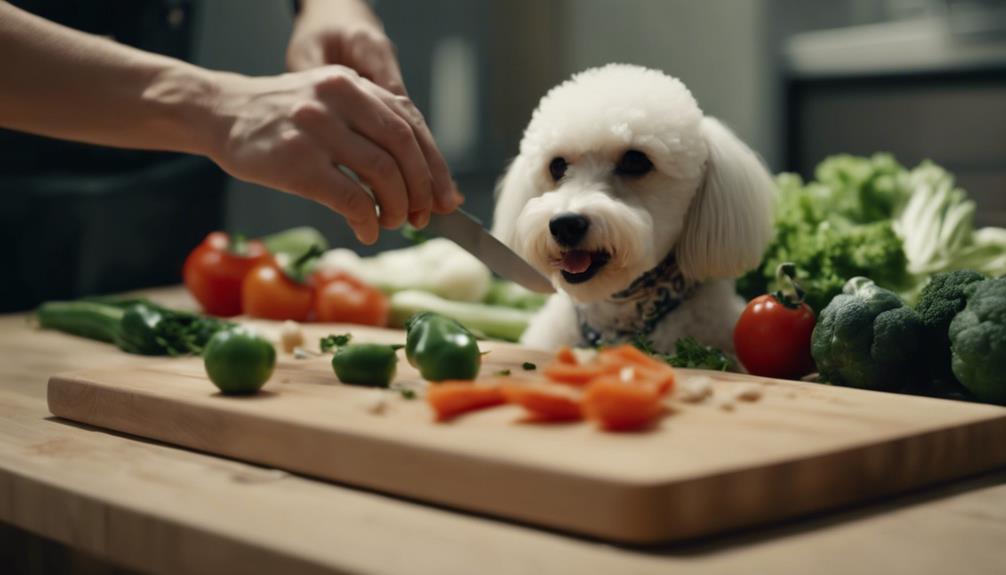If you're concerned about the time and effort required to cook for your poodle, rest assured that with some planning and simple recipes, providing safe and healthy ingredients can become a manageable routine. Understanding what goes into your pet's meals is crucial for their overall health and happiness. Consider this: did you know that certain kitchen staples can be harmful to your poodle? Stay tuned to discover key ingredients to avoid and how you can elevate your poodle's diet with easy-to-find, nutritious options. Your poodle's well-being starts with what's on their plate.
Key Takeaways
- Choose lean meats, fish, and eggs for essential protein sources.
- Include vitamins, minerals, and avoid toxic foods for poodle health.
- Opt for organic ingredients and safe grains in homemade recipes.
- Monitor weight, consult vet, and slowly transition to homemade diet for poodles.
Benefits of Homemade Dog Food
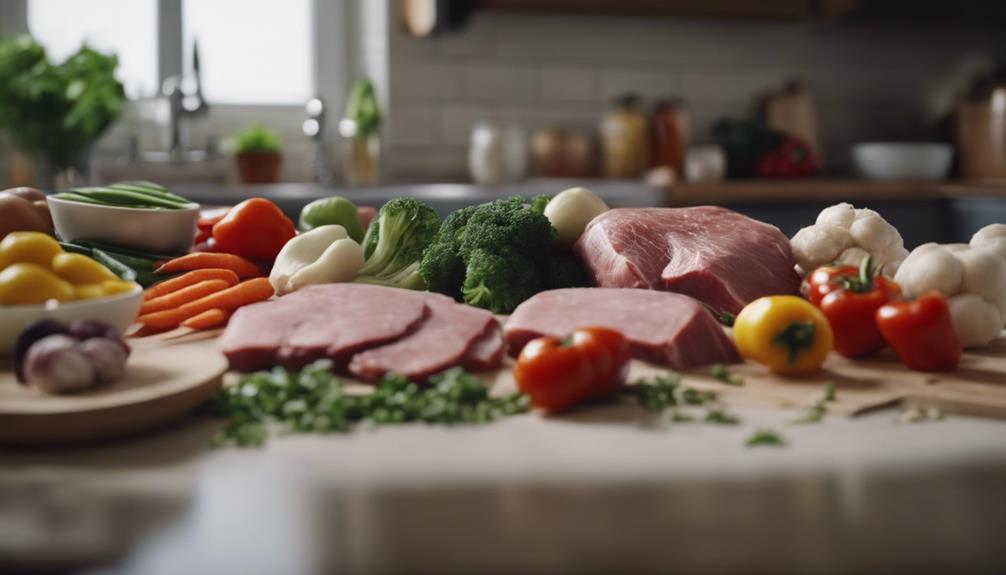
Homemade dog food offers poodle owners a controlled and customizable approach to ensuring their pet's nutrition and well-being. By preparing homemade meals, you have the advantage of controlling the ingredients that go into your poodle's food, reducing the risk of potential recalls and ensuring quality nutrition. Tailoring recipes to meet your poodle's individual nutritional requirements is key to promoting overall well-being and vitality.
One significant benefit of homemade dog food is the ability to avoid harmful additives and preservatives commonly found in commercial dog food. By opting for a natural diet free of these potentially harmful substances, you can promote a healthier lifestyle for your poodle. This approach allows you to closely monitor the quality of ingredients, ensuring optimal health benefits for your furry companion. Providing a homemade diet tailored to your poodle's specific needs can lead to improved health outcomes and a happier, healthier pet.
Essential Nutrients for Poodles
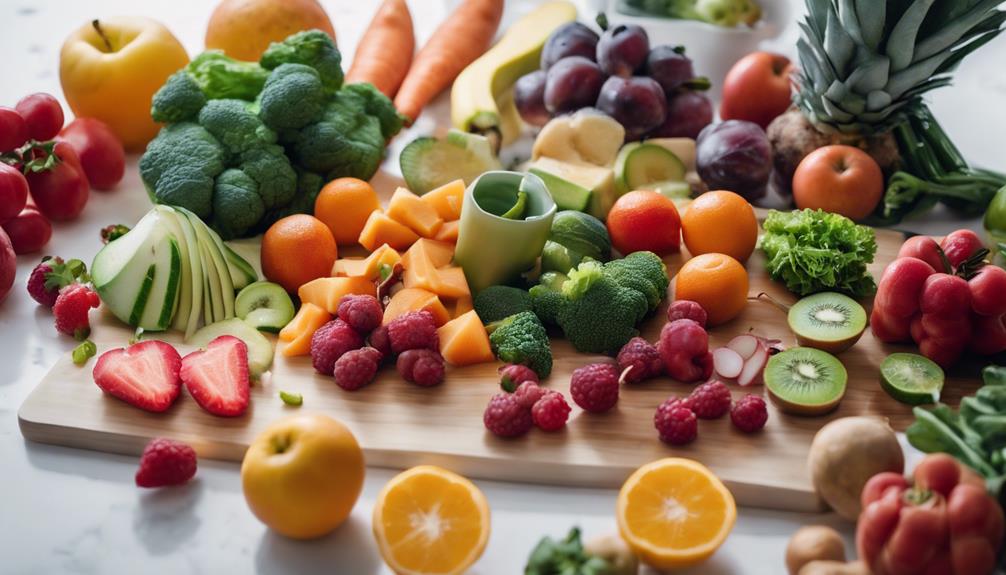
To ensure optimal health and well-being for your poodle, it is essential to understand the key nutrients necessary for their overall nutrition. Poodles require a balanced diet consisting of protein, carbohydrates, fats, vitamins, and minerals. Protein, found in lean meats like chicken and turkey, is vital for muscle development and repair in Poodles. Carbohydrates, sourced from foods such as brown rice and sweet potatoes, provide energy and fiber essential for digestive health. Healthy fats, like those in salmon and coconut oil, support skin and coat health, keeping your poodle's fur shiny and healthy. Including a variety of fruits and vegetables in their diet ensures that Poodles receive a spectrum of vitamins, minerals, antioxidants, and phytonutrients crucial for their overall well-being. By incorporating these essential nutrients into your poodle's meals, you can help them thrive and lead a healthy life.
Protein Sources for Poodles
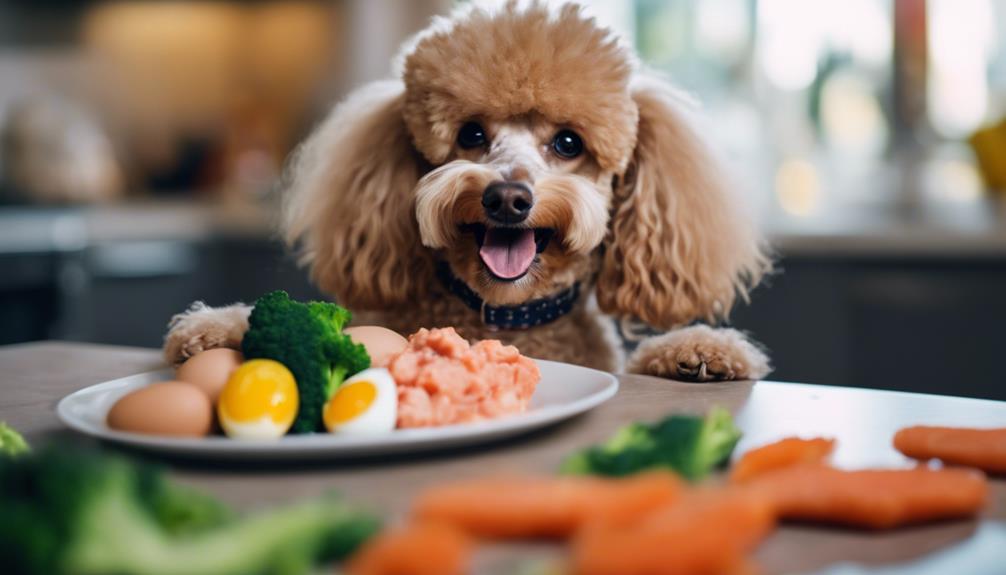
When selecting protein sources for your Poodle, opt for lean meats such as chicken, turkey, or lamb to support strong muscle development. Incorporating fish like salmon or sardines can enhance your Poodle's coat health with essential omega-3 fatty acids. Including eggs in their diet can contribute to overall health by providing vital amino acids and essential vitamins.
Meat for Strong Muscles
For optimal muscle development and overall health in your poodle, prioritize incorporating high-quality protein sources like lean chicken, turkey, beef, or fish into their diet. Protein is crucial for muscle development, repair, and maintenance in dogs, including poodles. Variety in protein sources ensures a well-rounded diet meeting their nutritional needs. Processed meats and fatty cuts should be avoided to prevent weight gain and maintain muscle mass. Consulting with a vet or canine nutritionist can help determine the ideal protein types and quantities tailored to your poodle's specific requirements. Here is a table showcasing some excellent protein sources for your poodle:
| Protein Sources | Benefits |
|---|---|
| Lean Chicken | High in lean protein |
| Turkey | Rich in essential nutrients |
| Beef | Good source of iron |
| Fish | Omega-3 fatty acids |
Fish for Shiny Coat
Enhance your poodle's coat health and overall well-being by incorporating fish, a rich source of omega-3 fatty acids, into their diet. Fish is an excellent protein source for dogs, especially Poodles, providing essential nutrients for a shiny coat and healthy skin. Consider adding salmon, mackerel, or sardines to your homemade dog food recipe to make sure your furry friend gets the benefits of omega-3 fatty acids. These healthy fats can reduce inflammation, promote skin hydration, and improve coat condition. Additionally, fish can support joint health, cognitive function, and immune system strength in dogs. Remember to cook the fish thoroughly before serving it to your Poodle to avoid any potential risks of bacterial contamination.
- Salmon, mackerel, and sardines are great fish options.
- Omega-3 fatty acids in fish reduce inflammation and improve coat condition.
- Fish supports joint health, cognitive function, and immune system strength.
- Incorporate fish into your Poodle's homemade dog food recipes.
- Ensure fish is cooked thoroughly to avoid bacterial risks.
Eggs for Overall Health
To improve your Poodle's overall health, incorporating eggs into their diet can provide essential amino acids, vitamins, and biotin for muscle maintenance, nerve function support, and healthy skin and coat. Eggs are a great protein source for Poodles, aiding in digestion and helping them maintain a healthy weight. Rich in B12, eggs support nerve function, while biotin promotes healthy skin and coat, reducing shedding and dryness. When feeding eggs to Poodles, ensure they are cooked thoroughly to avoid the risk of salmonella contamination. Below is a table summarizing the benefits of eggs for your Poodle:
| Benefit | Description |
|---|---|
| Protein Source | Essential amino acids for muscle maintenance and repair |
| Vitamins | Rich in B12 for nerve function and overall health |
| Biotin | Promotes healthy skin and coat, reducing shedding and dryness |
| Digestion | High-quality protein aids in digestion and helps maintain a healthy weight |
| Cooked Thoroughly | Ensure eggs are cooked thoroughly to avoid salmonella contamination |
Carbohydrates for Energy
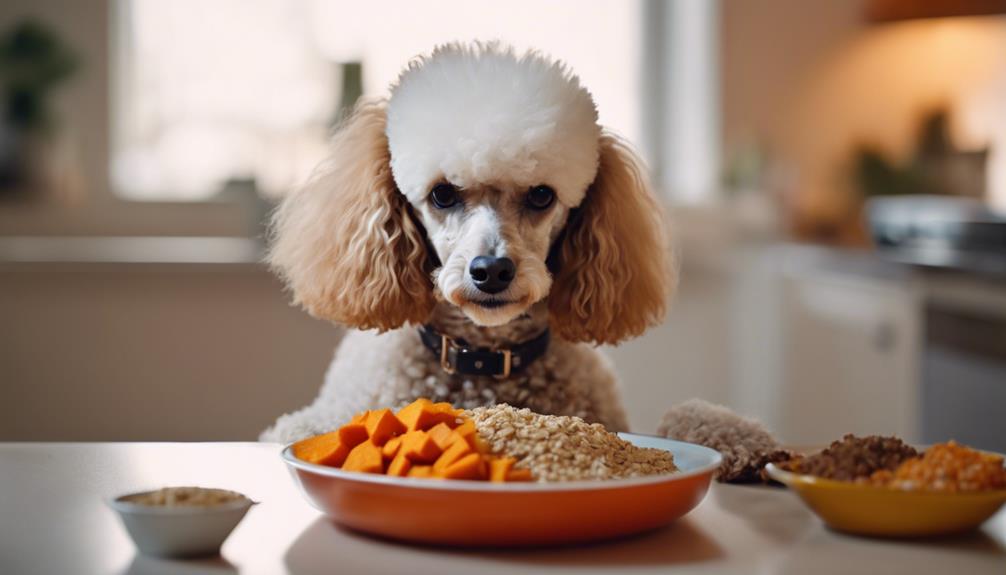
Carbohydrates play a vital role in providing essential energy for your poodle's daily activities and metabolic functions. When choosing carbohydrates for your poodle, opt for nutrient-rich sources like brown rice, sweet potatoes, and oats. These options are easily digestible, helping to maintain stable blood sugar levels and support overall health. By incorporating a variety of carbohydrates in your poodle's diet, you can provide different nutrient profiles and dietary benefits. Remember, moderation is key when serving carbohydrates to your furry companion. Properly cooked carbohydrates can be a valuable component of a balanced and healthy diet for your poodle.
- Nutrient-rich sources like brown rice, sweet potatoes, and oats
- Easily digestible options for poodles
- Help maintain stable blood sugar levels
- Support overall health
- Offer different nutrient profiles and dietary benefits
Healthy Fats for Poodles
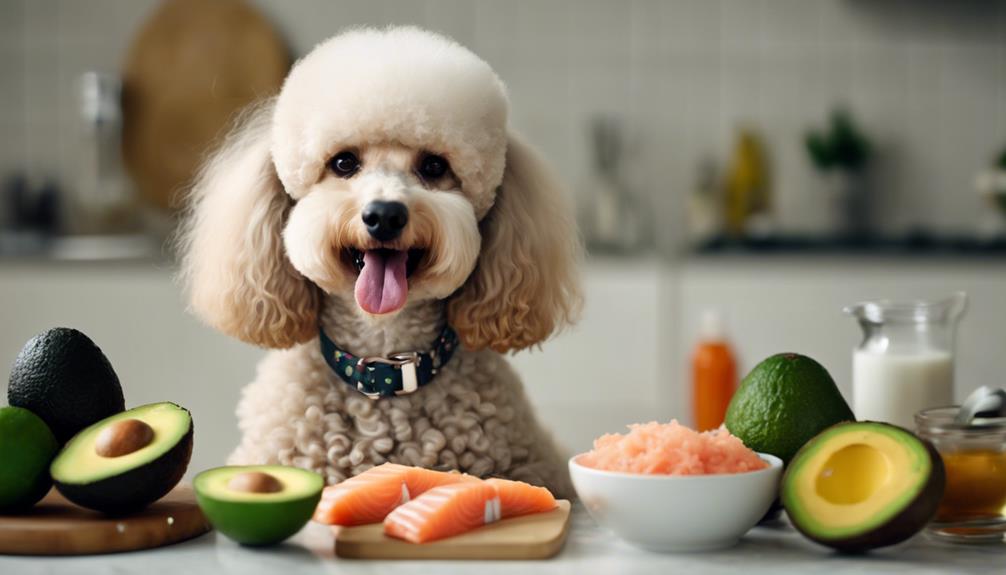
Incorporating healthy fats into your poodle's diet is crucial for maintaining optimal skin and coat health. Omega-3 and omega-6 fatty acids, found in sources like fish oil, flaxseed oil, and coconut oil, play a vital role in promoting skin health, coat health, immune function, and joint health in Poodles. These healthy fats not only help reduce inflammation but also contribute to the overall well-being of your furry companion. Omega-3 fatty acids, commonly found in fish oil, can improve skin hydration, reduce shedding, and enhance the shine of your poodle's coat. On the other hand, omega-6 fatty acids, such as those present in flaxseed oil and coconut oil, support immune function and joint health. By carefully balancing these fats in your poodle's diet, you can ensure they lead a vibrant and healthy life, full of energy and vitality.
Vitamins and Minerals
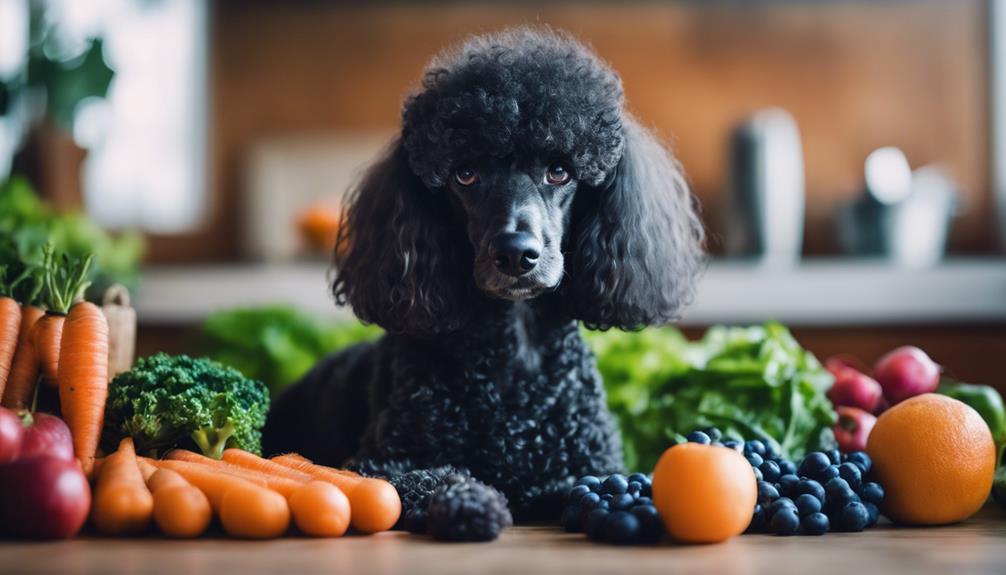
Ensuring your poodle receives adequate vitamins and minerals is essential for supporting their overall health and well-being. When preparing meals for your furry companion, it is crucial to include a variety of nutrients that promote optimal health. Here are some key points to consider:
- Vitamins: Essential vitamins such as A, D, E, and K are vital for your poodle's overall health and immune function. Vitamin C plays a role in collagen formation and provides antioxidant protection for their skin and coat.
- Minerals: Minerals like calcium, phosphorus, and zinc are necessary for maintaining bone strength and supporting metabolism. These minerals are crucial for your poodle's well-being.
- Iron: This mineral is important for oxygen transport in the blood and can help maintain your poodle's energy levels.
- Balanced Diet: A proper balance of vitamins and minerals in your poodle's diet is key to preventing deficiencies and ensuring they thrive.
Avoid Toxic Foods
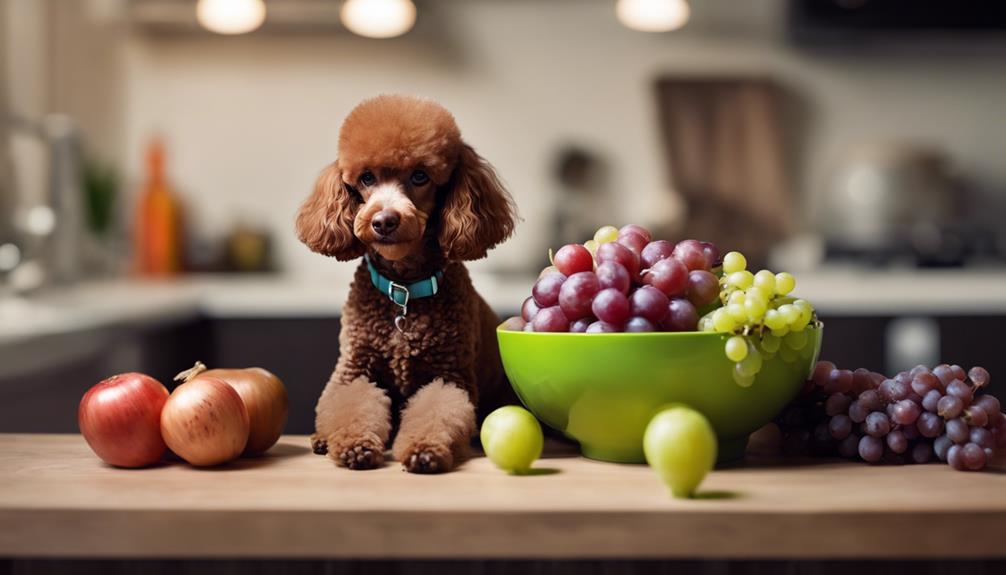
To safeguard your poodle's health and well-being, it is crucial to be mindful of toxic foods that can be harmful or even fatal to them. Poodles are particularly sensitive to certain foods like avocado, macadamia nuts, caffeine, and alcohol. These items can lead to potential health issues, causing symptoms such as vomiting, diarrhea, weakness, tremors, seizures, and even organ failure if ingested. It is essential for poodle owners to be aware of common toxic foods and keep them out of reach to prevent accidental ingestion by their pets. Below is a table outlining some toxic foods for poodles that should be avoided:
| Toxic Foods | Potential Harmful Effects |
|---|---|
| Avocado | Can cause vomiting and diarrhea |
| Macadamia nuts | May lead to weakness and tremors |
| Caffeine | Can result in seizures and increased heart rate |
| Alcohol | May cause organ failure and coma |
Organic Vs. Non-Organic
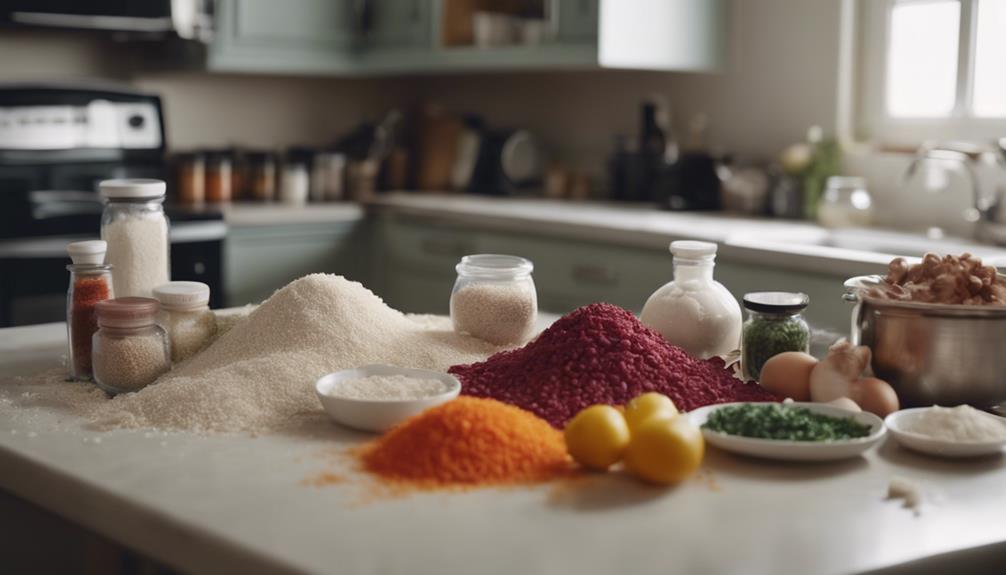
Being mindful of the ingredients you choose, especially when it comes to organic versus non-organic options, can significantly impact your poodle's health and well-being.
- Organic ingredients are grown without synthetic pesticides or fertilizers, reducing potential chemical exposure to your poodle.
- Non-organic ingredients may contain pesticide residues that could be harmful to your poodle's health over time.
- Organic farming practices often prioritize soil health and biodiversity, which can lead to higher nutrient content in organic ingredients.
- Non-organic ingredients may have lower nutrient levels due to intensive farming methods that deplete the soil of essential minerals.
- Choosing organic ingredients for your poodle's food can support their overall well-being and reduce their exposure to potentially harmful substances.
Selecting organic ingredients not only provides a safer option for your poodle but also ensures a higher nutritional value in their meals. By opting for organic choices, you are promoting sustainable farming practices that benefit both your pet's health and the environment.
Homemade Treat Ideas
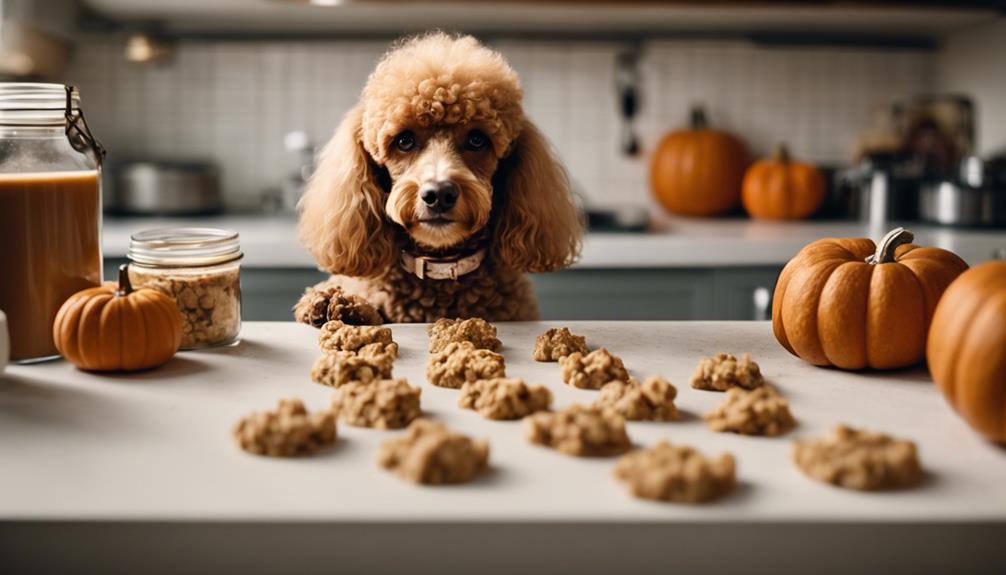
When making homemade treats for your poodle, consider ingredient safety tips to ensure their well-being. Nutritious snack options like pumpkin, oats, and blueberries can provide health benefits for your furry friend. Try easy baking recipes using safe ingredients to create delicious treats your poodle will love.
Ingredient Safety Tips
For safe and healthy homemade treats for your poodle, focus on using dog-safe ingredients such as cooked lean meats, fruits, and vegetables. When making treats, be mindful of the following safety tips:
- Avoid Harmful Foods: Keep chocolate, grapes, onions, and xylitol away from your poodle's treats.
- Incorporate Safe Grains: Opt for nutritious grains like oats and brown rice in your homemade treats.
- Check for Allergies: Before introducing new ingredients, check for any allergies your poodle may have.
- Choose Homemade Treats: Homemade treats can be a healthier option than store-bought alternatives, promoting your poodle's overall well-being.
Nutritious Snack Options
To provide your poodle with nutritious snack options, consider incorporating ingredients like pumpkin, peanut butter, and blueberries into homemade treats. These homemade treats not only cater to your poodle's taste buds but also offer various health benefits. Pumpkin is rich in fiber and can aid in digestion, while peanut butter provides a good source of protein and healthy fats. Blueberries are packed with antioxidants that support your poodle's overall well-being. Nutritious snacks play a crucial role in training, dental health, and meeting the nutritional needs of your poodle. By avoiding harmful ingredients like chocolate, xylitol, and grapes, homemade treats allow you to control what goes into your poodle's snacks, ensuring they are free from artificial additives and preservatives.
Easy Baking Recipes
Consider exploring easy baking recipes that incorporate nutritious ingredients like pumpkin, peanut butter, and oats to create homemade treats for your Poodle that are both safe and healthy. When making homemade treats for your furry friend, you can ensure they are tailored to meet their specific dietary needs. Here are some benefits of homemade treats for your Poodle:
- Control Ingredients: Customize treats to avoid preservatives and allergens.
- Nutritional Value: Use high-quality, dog-friendly ingredients for added nutritional benefits.
- Dietary Customization: Cater to your Poodle's dietary requirements or restrictions.
- Bonding Opportunity: Enjoy bonding and positive reinforcement while baking treats.
- Avoid Additives: Homemade treats eliminate additives commonly found in store-bought options.
Hydration Importance
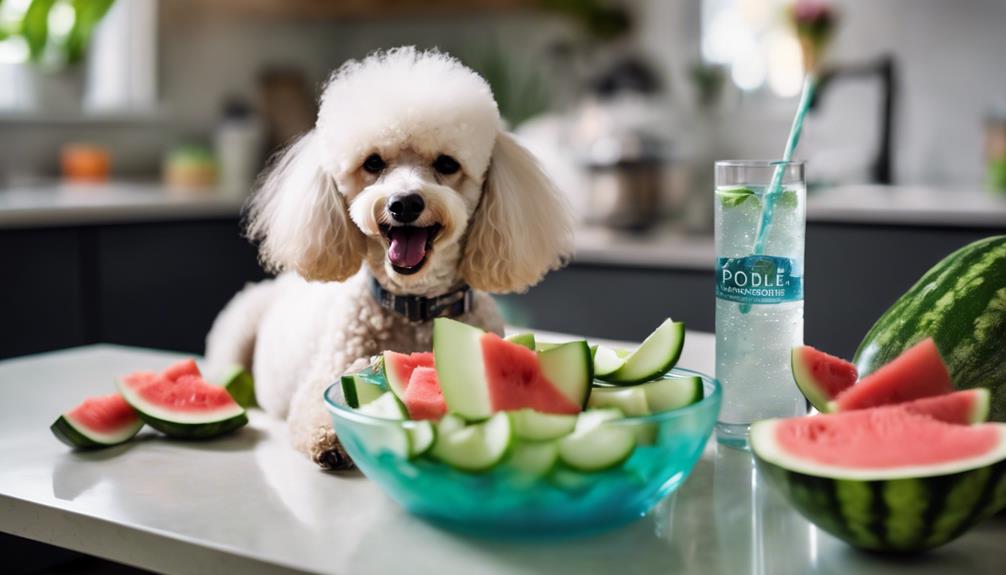
Adequate hydration plays a vital role in maintaining the health and well-being of your poodle. Poodles, like all dogs, rely on proper hydration to support their bodily functions. Dehydration in poodles can lead to severe health issues, including urinary problems and organ dysfunction. To prevent dehydration, ensure your poodle has access to clean, fresh water at all times. Monitoring your poodle's water intake is crucial, especially during hot weather or periods of increased physical activity. If your poodle struggles to drink enough water, incorporating moisture-rich foods like cooked vegetables or wet dog food into their diet can help increase their daily water consumption. Remember, maintaining proper hydration is essential for your poodle's overall health and vitality. Be attentive to their water intake, provide fresh water consistently, and consider adding hydration-boosting foods to keep your furry friend healthy and happy.
Meal Prepping Tips
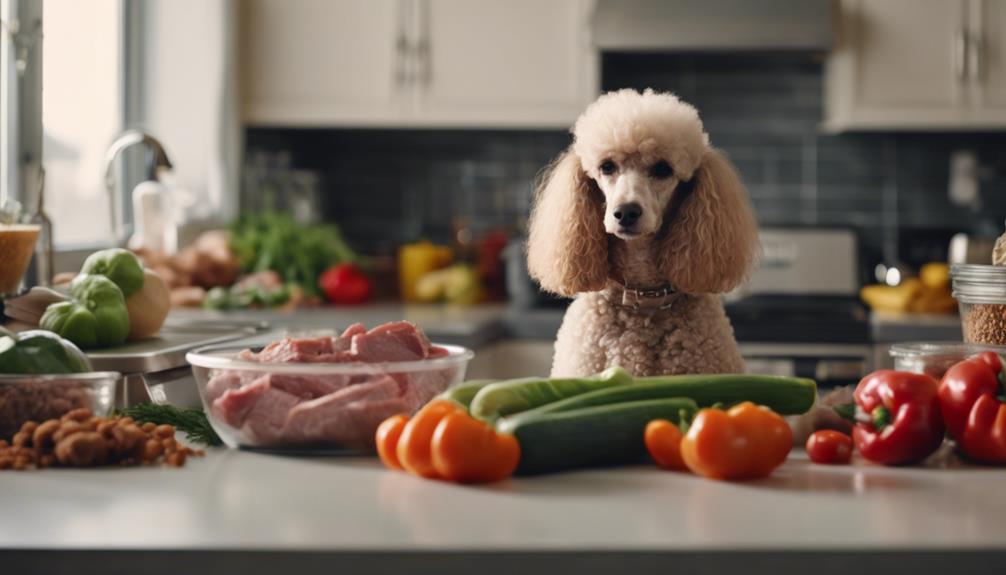
When meal prepping for your poodle, focus on incorporating a variety of safe and healthy ingredients such as lean proteins, vegetables, and grains to meet their dietary requirements effectively. To ensure balanced meals and proper nutrition for your furry friend, follow these practical tips:
- Utilize ground lean proteins like turkey or chicken to provide essential amino acids for muscle maintenance.
- Include a mix of vegetables such as carrots, peas, and green beans to offer vitamins and fiber for digestion.
- Incorporate grains like brown rice or quinoa to supply energy and fiber for overall health.
- Opt for nutrient-rich foods like sweet potatoes or blueberries to boost antioxidants and vitamins in your poodle's diet.
- Divide prepared meals into portion-sized containers following vet-recommended guidelines to control meal portions and maintain your poodle's health and weight.
Transitioning to Homemade Diet
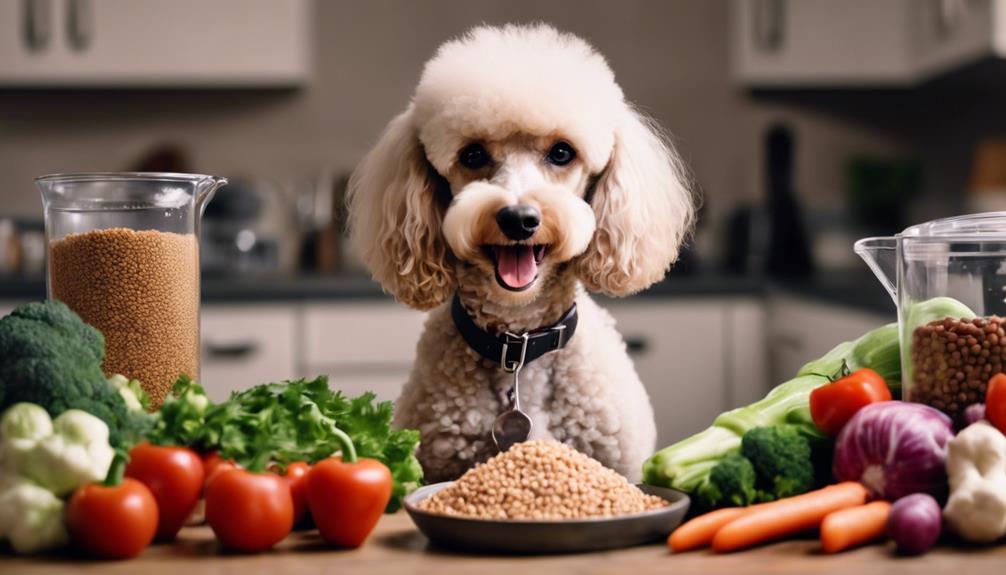
To effectively transition your poodle to a homemade diet, gradually introduce small amounts of homemade food mixed with their current diet over a period of 7-10 days to prevent digestive upset. Starting with a small portion and increasing the homemade food gradually allows your poodle's digestive system to adjust to the new diet. During this transition, monitor your poodle closely for any signs of intolerance or allergies. If you notice any adverse reactions, consult your veterinarian for guidance.
Your veterinarian can provide valuable insights on how to adjust the homemade diet to meet your poodle's specific nutritional needs. They can also offer advice on monitoring your poodle's weight, energy levels, and overall health throughout the transition process. Keeping track of these factors will help ensure that your poodle is adapting well to the new diet. By following this gradual approach and seeking professional guidance, you can help your poodle transition smoothly to a homemade diet while safeguarding their digestive health and overall well-being.
Frequently Asked Questions
What Are the Best Ingredients to Put in Homemade Dog Food?
For homemade dog food, the best ingredients include lean protein sources like turkey, brown rice for grains, carrots for vegetables, blueberries for fruits, fish oil for healthy fats, parsley for flavor, eggshells for calcium, a vet-approved vitamin supplement, and homemade treats.
What to Cook for Poodles?
When cooking for Poodles, consider their preferences and nutritional needs. Homemade recipes with poodle-friendly foods like lean proteins and vegetables cooked in safe methods can benefit your furry friend. Consult vets for tailored meal plans.
What Should Top 3 Ingredients Be Dog Food?
For optimal dog food, prioritize high-quality protein sources like chicken or beef, whole grains such as brown rice, and a mix of vegetables like carrots and sweet potatoes. Including healthy fats like fish oil boosts your dog's coat and health.
How Do I Make Sure My Homemade Dog Food Is Balanced?
To ensure your homemade dog food is balanced, focus on nutritional balance with varied protein sources, essential vitamins, proper portions, and digestive health. Consider calcium levels, Omega-3 fatty acids, homemade treats, and meal planning for optimal health.
Conclusion
In conclusion, remember that cooking for your poodle with safe and healthy ingredients is crucial for their well-being. Don't forget to consult with a vet for dietary adjustments and ensure the recipe meets your poodle's nutritional needs. And always remember, your poodle may have a refined palate, but they'll appreciate the effort you put into providing them with a balanced and nutritious homemade meal. Happy cooking!
